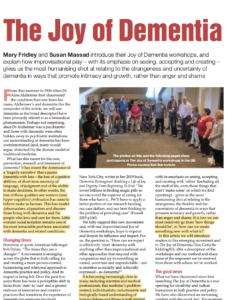 Mary Fridley and Susan Massad, faculty at the Eastside Institute in New York, are changing the narrative around dementia. In a culture that views dementia through a medical model of disease, Mary and Susan are showing where many opportunities exist for creativity and meaningful exchange among all those impacted by dementia (Patients, caregivers, families, etc.). Theirs is a life-affirming, relational approach that puts a fresh face on dementia in a culture that values cognitive capabilities at the expense of noticing the range of human abilities we are born with.
Mary Fridley and Susan Massad, faculty at the Eastside Institute in New York, are changing the narrative around dementia. In a culture that views dementia through a medical model of disease, Mary and Susan are showing where many opportunities exist for creativity and meaningful exchange among all those impacted by dementia (Patients, caregivers, families, etc.). Theirs is a life-affirming, relational approach that puts a fresh face on dementia in a culture that values cognitive capabilities at the expense of noticing the range of human abilities we are born with.
It’s a radical approach that they put into practice through their “Joy of Dementia” workshops that use improvisational theatre and play to connect the different players in a community impacted by dementia.
CHECK OUT THE REST OF OUR CREATIVE THIRD ACT INTERVIEWS
Subscribe to the show on iTunes to listen to upcoming episodes and hear all our conversations.
And please leave a rating and review.
Need help subscribing? Click here.
Highlights from the episode:
The limitations of the “tragedy narrative” surrounding dementia.
Why the medical model for approaching dementia doesn’t work.
The importance of seeing dementia in a relational context.
Why over-valuing cognitive strength can limit our ability to see people’s other strengths and gifts.
Looking beyond the patient to see the community touched by dementia and its care.
The opportunity improv offers for giving that community a way to connect and play together.
Why development takes place in a group environment.
What a “Joy of Dementia” workshop looks like.
What opens up when we see life as a performance.
How empowering it can be to relate to group members as performers.
The power of saying “yes/and” with people with everyone, especially those with dementia.
“Appreciating people is an unrecognized and underperformed element of our lives.”
Hear the interview:
Click here to go to the full interview on iTunes (#112).
And please leave a rating and review!
More about our guest:
Mary Fridleyis pro-bono Director of Special Projects at the East Side Institute in NYC and an accomplished teacher and workshop leader. She practiced social therapy for 12 years and continues to use the social therapeutic approach as an Institute faculty member. Mary was featured in a February 2019 Washington Post article, “Changing ‘the tragedy narrative’: Why a growing camp is promoting a more joyful approach to Alzheimer” and, with Susan Massad, is co-author of several articles on this work, including one in the Australian Journal of Dementia Care. Mary is also a playwright and theater director and works as a non-profit fundraising consultant.
Susan Massad is a retired physician with 51 years of practice and teaching in internal medicine. In 2006, Susan launched a senior theater workshop, The New Timers, at the All Stars Project in NYC and is a faculty member of the Institute, where she leads ongoing conversations on health, wellness and growing older. She is co-author of a chapter, “Creating An Ensemble for Performing Health” that will appear in an upcoming book published by the Taos Institute and, with Mary Fridley, is co-author of several articles on this work, including one in the Australian Journal of Dementia Care. Susan has also written a play, Remember? Remember!, that deals with aging and memory loss.
The Show Notes

For more information about the Eastside Institute or the Joy of Dementia Workshops go here;https://eastsideinstitute.org/the-joy-of-dementia/
Mary and Susan welcome your thoughts. Mary can be reached at mfridley@eastsideinstitute.org and Susan at susanmassad38@gmail.com.
For a copy of a great article describing their work from the Australian Journal of Dementia Care. .AJDC Feb-Mar 2020_The Joy of Dementia
Books referred to:
The Overweight Brain by Eastside Institute Director Lois Holtzman
The End of Knowing by Fred Newman and Lois Holzman



